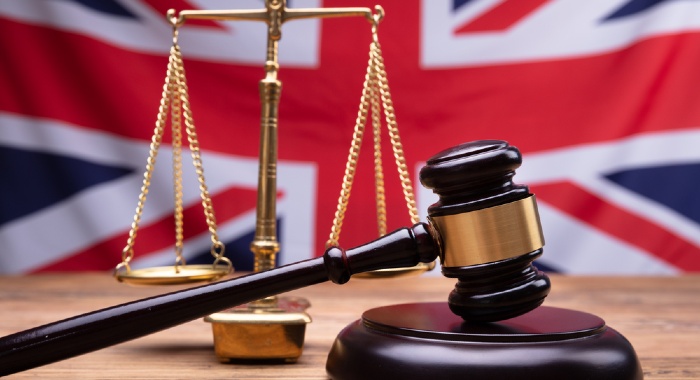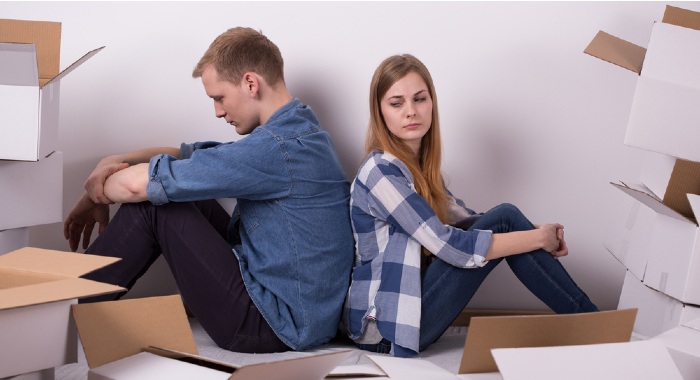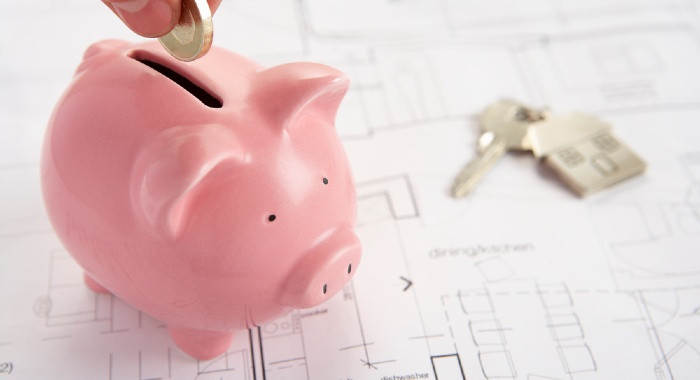Property buying can be a perilous and expensive undertaking for most of us, but what about unmarried couples who buy a house?
For unmarried couples buying a house, there are some key legal issues that need to be understood that only refer to those who are buying a property and who are not married.
The biggest issue of all, is what will happen to their shared home should they decide to break up?
This issue will extend to:
- Same-sex couples
- Males and females cohabiting
- Friends buying a home together
Here, we take a closer look at the process for unmarried couples wanting to buy a home together.
But why is this so important? Because the number of people cohabiting without being married is steadily going up, according to statistics by the Office for National Statistics.
Having bought a house before we were married, we know that the real question is how unmarried couples can protect themselves – and avoid the potentially expensive process should they split up.
Legal situation for unmarried couples buying a house

Let’s start with an important factor: the legal position of anyone who isn’t married buying a house together. Legally, unmarried couples do not have the same rights and protections as married couples or civil partners.
This means that unmarried couples buying a house are treated the same way by the law as anyone who is not married buying a property together.
For that reason, unmarried people should take some steps to safeguard their interests and avoid potential disputes in the future when buying a home together.
Ownership
When a married couple buys a home together, they both own the house equally as it becomes part of the matrimonial asset. But for unmarried couples or friends, this is different.
Before you sign the contract, you have to decide on the ownership of the property. There are two options you can choose from:
Beneficial joint tenants
This means that the house will belong to both of the owners jointly. Under this term, you are joint tenants and do not own specific shares and you cannot give away your share in the property as part of a will.
Should either of the named couple die, then their property interest will automatically pass to the other person. Most couples are likely to chose this option, especially if they are both putting in a similar amount.
Tenants in common

With the second option both owners jointly own it but each has a specific share of the property’s value. The owner is then free to sell or mortgage their share of the home or give it away.
It means you can decide to own the home 50:50 or for example 60:40, depending on how much money each party put in. More crucially, each person owns their share outright, so can decide to do with it what they want.
Most people who aren’t in a relationship buying a house together probably opt for this type of ownership, as it gives each party more freedom. However, some couples might also decide to choose this option.
When my now wife and I bought our first house together, weren’t married. I bought a house before, the sale of which was our deposit on the new house. This meant that I had put more money towards our new home.
After discussing it, we decided that the fairest thing to do would be to buy the new house as ‘tenants in common’ with myself having a bigger share than my wife. While we didn’t think we would split up, we wanted to be prepared for the worst case scenario.
While it isn’t the easiest conversation to have, it is vital that you do have it. We would recommend approaching it without letting feelings get involved. Look at it from an objective point of view.
The distribution of the shares in the property shouldn’t make any of the parties feel uncomfortable or as if they didn’t contribute enough.
It’s just a way to make provisions for the worst case scenario, which hopefully won’t happen. But if it does, it will help to make things a little easier. I am pleased to say that for us all went well, we got married a few years later.
Declaration of trust
If you have decided to own the property as tenants in common, you will be advised to draw up a declaration of trust. This is a legally binding document that sets out the agreement you have made in terms of ownership of the property.
It will be used when the property is sold to ensure that all parties involved receive the correct share. It can also be used in case of a transfer, when one person decides they no longer want to own their share in the property.
And of course, should an unmarried couple break up, the declaration will also be used. It will also form the legal base in case one of the parties involved dies to ensure their wishes regarding their share is carried out.
It’s also worth bearing in mind that this document will then be registered with the Land Registry, so there’s a legal record of who owns the property. This means that you need this record to be absolutely accurate.
A declaration of trust is only necessary when a property is owned by people as tenants in common. Beneficial joint tenants don’t need this document.
If a couple owns they home as joint tenants, they can draw up a declaration of trust, but it will change the ownership of their property to tenants in common.
Urban myth: a couple who lives together for 7 years is legally married

Have you ever heard the question ‘Are you legally married after 7 years?’ It’s an urban myth that seems to persist in many people’s mind.
Let’s be clear: you are not seen in the eyes of the law as being legally married if you have been together for more than seven years. But that doesn’t stop this myth from creeping up:
- One recent poll asked 2,000 adults in the UK the same question and found that 27% believed that this particular myth was true.
- Many people believe that they are in a ‘common law marriage’ but there is no concept of this at all. This is not a recognised legal status and people who live together do not have the same legal rights they would enjoy if they were married.
- In law, when married couples separate, there are some rights they have to make a claim against all or part of their partner’s assets, including the family home. But you have to get married for this law to apply.
And since there are no rights for unmarried couples to do the same, it’s only possible to obtain a share of their partner’s home if there is a written agreement in place such as a cohabitation agreement or a declaration of trust.
It will be these documents that will help prove that the partner has made a contribution to the family home.
How a break up affects the ownership of the property

While this isn’t a topic a young couple about to buy a house together is thinking of, it’s an important one. By putting the right measures in place when buying the house, you will prevent having to sort this out when emotions run high and hurt feelings make communicating effectively difficult.
As we have said, unmarried couples buying a house aren’t protected by the same laws as married couples, so they aren’t covered under the UK’s divorce law.
When people who aren’t married buy a property together, the conveyancing solicitor will always ask them how they want to own their new home. The question they give will determine what will happen when they split up.
Beneficial joint tenants
As we have explained, if you choose this ownership option, you both own the property jointly. In the case of a break-up, each party receives half of the property. If the property is sold, that means the money will be divided equally.
But keep in mind that you will have to pay off the mortgage in full, as well as pay any legal fees and estate agent fees before you can split the remaining funds.
If one party has put in more money to buy the house, they still only get half. So this is something to consider, when you buy the property. When all is well in a relationship, you might be happy both owning your home jointly, even if one person does put in more money.
After all, what’s money when love is concerned? However, when a relationship breaks up, things can change. And the person who put in more might now feel that they deserve to get a bigger share. This could lead to a long and expensive legal battle.
That’s why it’s so important for unmarried couples buying a house together to decide very carefully what type of ownership they want.
Equally, if one party wants to sell the house, but the other one doesn’t, the matter needs to be referred to a court. That’s because as both own the property jointly, both have to agree to the sale. And involving the courts means it could take a while and will cost a lot of money in legal costs for both parties.
Tenants in common

If an unmarried couple have bought a property as tenants in common, then after their break up, the each party retains the share they have been given in the declaration of trust.
When the house is sold, the proceeds, after any legals costs and remaining mortgage has been paid, will be split according to the share division set out in the declaration of trust.
However, there could still be trouble, because each party can do with their share of the house what they want. This means one person can’t stop the other from selling their share to someone else. Effectively, this means the remaining person might have to live with someone they don’t know.
To avoid such a situation, you could add a clause in the declaration of trust that deals with the eventuality that one party once to sell the property or their share.
It is advisable that any unmarried couple looking to buy a home together seeks legal advise and discuss any possible circumstances that might arise.
Buying a house as a married couple
Since we have focused on what happens to a house when an unmarried couple decides to separate, it is also worth looking at what happens when a married couple, or those in a civil partnership, decide to split.
- For divorcing couples, there is no standard split of their assets, and various factors will come into play, including what other assets they have such as their income and pensions.
- Compromise and communication are key to reach an agreement between the divorcing spouses and if you cannot come to terms, then it’s time to have a court decide for you.
- You’ll need to speak with divorce lawyers since the court can make a property adjustment order to transfer the home from joint to sole ownership, or order the sale of the property or postpone its sale.
- Both spouses will have a right to a home in the short-term which means they can stay in or are able to return to their home until a permanent order is made by the court.
You should also appreciate that moving out of the family home will not count against you in any divorce proceedings in the eyes of the court.
Buying A Property? FREE Step-By-Step Platform
Conclusion
Essentially, the simple advice for unmarried couples who buy a house is that they really should take legal advice because:
- Having the correct legal documentation in place at the beginning of property ownership will help hugely should that relationship come to an end
- The documentation will spell out what each of the unmarried partners is likely to receive in the event of a break-up
It’s worth pointing out that couples who are not married and buying a house should not listen to myths about having a ‘marriage under common law’ once you have racked up seven years of cohabitation as this could be a very expensive mistake to make.
It’s also important that you always seek experienced legal advice to ensure you are not caught out financially and emotionally in the future.
However, from our own experience we should say that while all this sounds complicated and also a bit scary, don’t be put off by it. Buying a house as an unmarried couple is a beautiful thing.
And as long as you have taken legal advice and put everything in place for the worst case scenario, there is nothing to be afraid of.





